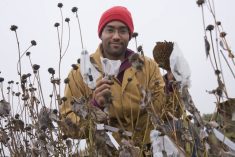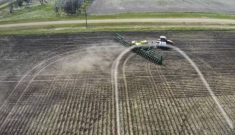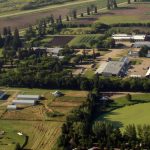THE INDUSTRY IS ALLOWINGits problems to define it rather than its opportunities,” says John Kolk, getting immediately to his point. As a third-generation grain farmer from southern Alberta, Kolk says agriculture’s brand is eroding, and there is a growing public perception that whiney “poor me” farmers are always looking for some form of government bailout.
“Agriculture has its problems and I don’t mean to minimize that, but all industries and professions have their problems,” Kolk says. “Ours are no worse.
Read Also

How scientists are using DNA and climate data to breed crops of the future
A method for forecasting how crops will perform in different environments so that plant breeders can quickly select the best parents for new, climate-resilient varieties.
“The public still has a level of trust in agriculture, but cracks are starting to appear,” Kolk says.
“We need to get out the message that we are good stewards of the land and are concerned about sustainability and food safety,” Kolk says. “We need to improve our practices in some areas, but we also need to do a better job of telling the story of how we do a good job and show there are opportunities in agriculture, rather than this ‘pity me’ thinking.”
Kolk and his brother Leighton grew up on the family farm just north of Lethbridge that produced crops, beef, poultry and even dairy at one time. The brothers took over the farm in 1989, but have just gone through a restructuring to create two farm business entities to make way for the next generation. Leighton and his family manage the livestock business, while John and his family focus on grain and oilseeds on about 4,000 acres, with about 40 per cent of that land under irrigation.
Over the years Kolk has been involved in community and industry organizations ranging from Lethbridge County Council to the Alberta Chicken Producers, the Chicken Farmers of Canada (which he chaired), the board of Alberta Environmental Farm Plan Co., the Southern Alberta Alternative Energy Partnership Advisory Committee, the Alberta Water Council and the Alberta Biodiversity Monitoring Institute.
Kolk says Canadian farmers have a good thing going. They’ve got a good reputation, a good supply of natural resources and a climate that complements healthy food production in a peaceful nation. Now, he says, farmers need to capitalize on those advantages.
As the Wal-Marts and McDonald’s put more demands on their suppliers for healthy foods produced with environmentally sound and humane production practices, the pressure will trickle down to primary producers to meet the standard.
“I don’t see it so much as getting a premium for following good production practices as an issue of market access,” says Kolk. “We can either be the ones who supply these products, or someone else will.”
Kolk says it will be important for Canadian producers to follow good land and environmental stewardship practices, proper water management, and proper animal production and care practices just to stay in the game. And they need to convey this to consumers to maintain the brand and reputation of agriculture.
“And it is important that we do what we say, and be transparent about it,” Kolk says. “A lot of people don’t appreciate the impact of social media.
Everything we do is being watched and one exposé of a bad practice could cost the industry billions of dollars. There is nothing we do today that can’t be exposed and unravelled by a kid with a cellphone.”
Kolk encourages producers to appreciate the value of biodiversity — the value of a multi-use concept for the land and water resources. He says maintaining habitat, wetlands and protecting water resources isn’t about show.
“I am not talking about going back to some pristine kind of wilderness,” Kolk says. “I believe the land and resources are here for our use. But maintaining biodiversity isn’t just about good PR, it is for our own good health, and the health of the land and the environment. We need to recognize the value of biodiversity.”
As the world population grows and natural resources — particularly fresh water — become scarce in many parts of the world, Kolk says Canada will have opportunities to export what he describes as “virtual water.” Countries such as Israel and China and even parts of the U.S. are striving to make the most efficient use of their limited water resources, but there will be increasing opportunities for Canada to export its well-managed water resources in the form or cattle and grains and other agricultural products.
Kolk strongly supports more investment in agricultural research to improve production practices and also to develop “the next canola.”
“It is a tired example, but that is the type of innovation we need for the industry to grow,” Kolk says. “At one time it was King Wheat in Canada, and now canola is taking the lead in farm incomes, and that has happened within just 40 years. We need to maintain research into improved farming practices and new product development.”
While there are great opportunities in agriculture, he says Canada needs to develop a “suite of risk management tools” to encourage both investors and producers to the industry. He isn’t talking about government handouts, but risk management programs that will attract young farmers into the industry, and give bankers and investors the confidence to invest.
And if the industry does need assistance from government to overcome weather or market disasters, producers need to be prepared to give something back.
“What irks me are people who think farmers need to be protected,” Kolk says. “When you protect people, they become dependent. And farmers cannot be dependent on government bailouts.”
When the industry does need assistance, Kolk says, “farmers should be prepared for the government or society to say ‘OK, you’re getting this help, now what are you prepared to give back on the environmental side? What are you prepared to do to improve water-use efficiency or to reduce your carbon footprint?’
“As producers we need to be prepared to meet certain standards and provide a value proposition, so we are not just asking for dollars that go into an endless pit.”
———
“ What Irks Me Are People Who Think Farmers Need To Be Protected.” — John Kolk














